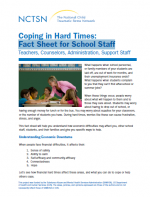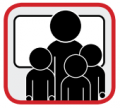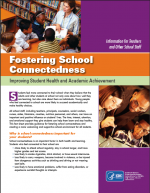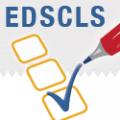Creating a culturally responsive classroom allows teachers to understand the different cultures students bring to the classroom, while recognizing and valuing individual student strengths and needs. Understanding the diverse cultures of students and creating inclusive learning environments can assist teachers with creating relationships with students that are built upon collaboration and mutual respect. In turn, students will feel more empowered to speak out, ask questions, and give input to classroom procedures.
Not only do quality relationships among teachers and students improve students’ academic success, but fostering positive relationships with students' families also can contribute to students’ success in the classroom. Involving families in the educational process should not be viewed as a one-time event (e.g., teacher–parent conferences), but rather as a continual process in which teachers begin to understand and value the strengths and needs of the families they serve as well as their diverse cultural backgrounds.
Positive relationships and attitudes among teachers and students can support an environment in which students feel safe and learning takes place. Students feel more connected with their school and community when an adult provides encouragement to students to become actively involved within and outside the classroom. Teachers also can coordinate links between the school and community resources to further provide services that enhance classroom instruction.
Bucalos, A. B., & Lingo, A. S. (2005). What kind of "managers" do adolescents really need? Helping middle and secondary teachers manage classrooms effectively. Beyond Behavior, 14(2), 9–14.
Cowan, K. C., Vaillancourt, K., Rossen, E., & Pollitt, K. (2013). A framework for safe and successful schools [Brief]. Bethesda, MD: National Association of School Psychologists. Available online at www.nasponline.org/schoolsafetyframework.
Dietrich, L., & Cohen, J. (2021). Understanding classroom bullying climates: the role of student body composition, relationships, and teaching quality. International Journal of Bullying Prevention, 3(1), 34-47.
LaRocque, M., Kleiman, I., & Darling, S. M. (2011). Parental involvement: The missing link in school achievement. Preventing School Failure, 55(3), 115–122.






